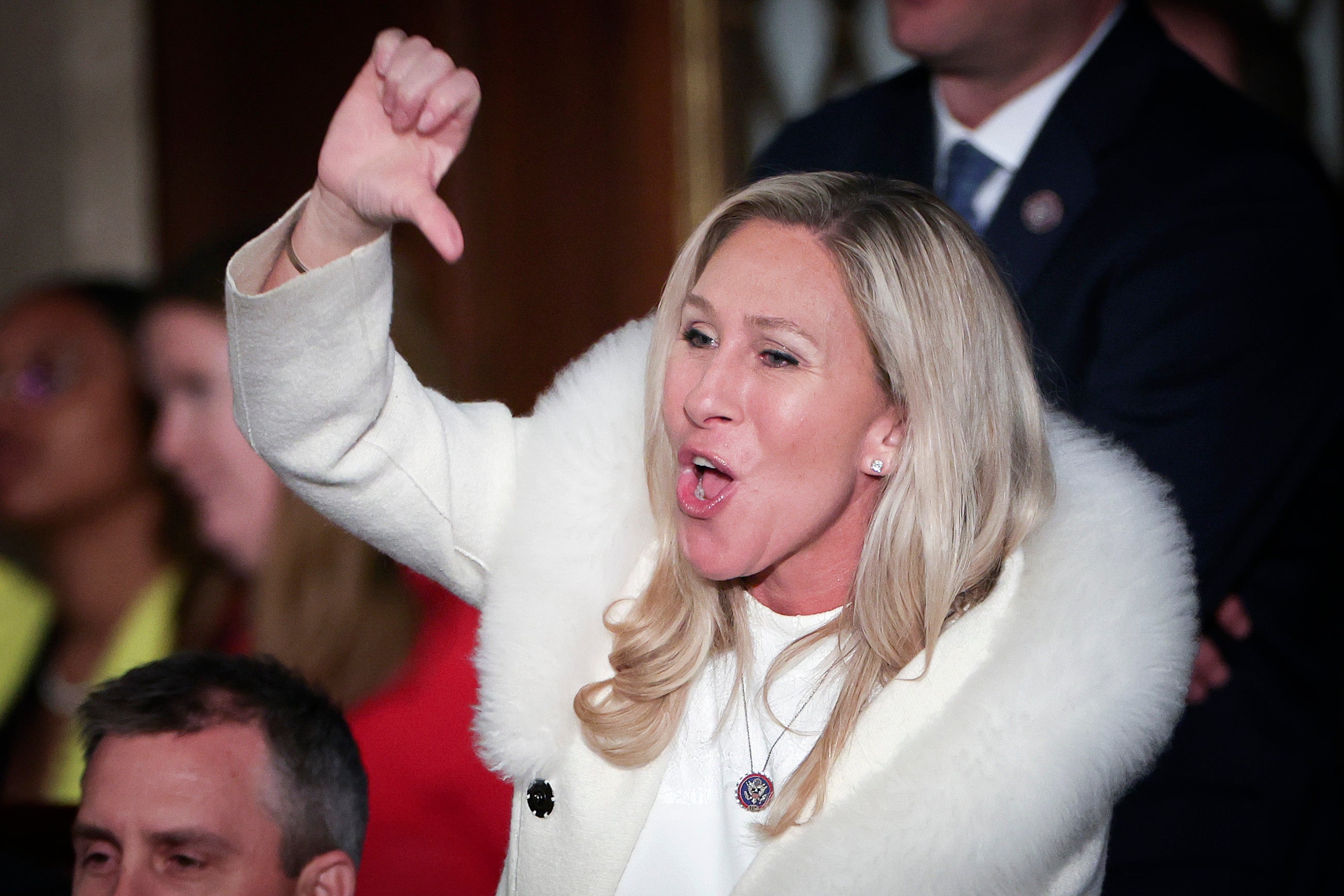Marjorie Taylor Greene is too late. America’s national divorce happened long ago
America is in need of a national marriage guidance counsellor


When Marjorie Taylor Greene suggested America needed a “national divorce” there was nothing less than a frenzy.
Traditional conservatives such as Liz Cheney suggested the congresswoman from Georgia was potentially breaking the law with her words.
“Our country is governed by the constitution” she tweeted. “You swore an oath to support and defend the Constitution. Secession is unconstitutional. No member of Congress should advocate secession, Marjorie.”
Meanwhile, a number of progressives were saying bring it on. They pointed to various studies that show blue states have long paid more in taxes than red states, and that a split would lower the cost of living in places such as Connecticut, which actually pays more to the government than it receives.
(A little embarrassingly for Republicans, one of the worst states in terms of taxes paid compared to federal money received, is Mitch McConnell’s Kentucky which runs a deficit of $14,318.)
In truth, both arguments rather miss the point.
Greene is not so much wrong when she calls for a national divorce, but that she is a bit late. In many ways, large and small, America is already an utterly divided nation and has been for some time.
Need convincing? Consider that in 13 states abortion is now entirely banned, but for the rarest of circumstances, such as to protect the life of the mother.
In Greene’s Georgia, abortion is banned after six weeks, a time when many women do not even know they are pregnant.
Meanwhile in Washington State, where abortion remains legal, legislators have been working to make it a right afforded by the state’s constitution.
What about guns? California, the country’s most populous state, has some of the strictest guns laws in the nation and has long been a Democratic stronghold.
It has not stopped gun deaths, and officials say they can do little about weapons brought into the state, but the regulations help place California 46 out of 50 when it comes to gun deaths per capita.
By contrast, Republican-red Mississippi has some of the very weakest regulation relating to the sale of firearms.
The Giffords Center, a non-profit founded by former congressman Gabby Giffords, who narrowly survived being shot, says it has the highest number of deaths.
“Mississippi passed a dangerous permitless carry law in 2016 which allows almost anyone to carry hidden, loaded guns in public without a background check or law enforcement oversight,” it says.
There are many things Americans agree on.
Research carried out to coincide with July 4 2022 by the Pew Research Center suggested 52 per cent of Americans thought their country to be the greatest in the world, though two-thirds thought it was less respected internationally than it was. About 66 per cent say the country’s openness to people from around the world was “essential to who we are as a nation”.
Other surveys suggest a majority of support for access to abortion, and increasing taxation on the rich.
But in so many ways, the gap between people, and communities, is vast. While about 30 per cent of Americans feel descendants of slaves should be paid reparations, in many red states there are bitter wars at school-boards over whether or not pupils should even be taught about slavery.
In her tweet, Greene wrote: “We need a national divorce. We need to separate by red states and blue states and shrink the federal government. Everyone I talk to says this.”
It might not be so simple. Oftentimes a state, for example Washington, can be starkly divided between its blue urban areas and its red hinterland.
There have been previous times in America’s past when the nation was bitterly divided, not least at the time of the Civil War. During the 1950s and 1960s, civil rights activists had to battle politicians who wanted to defend segregation with their dying breath.
Ronald Reagan and George W Bush were figures of intense hate for many liberal Americans, in the same way Jimmy Carter and Barack Obama were for conservatives.
A difference in those earlier times, perhaps, was that the division did not feel so deep.
It was possible for a person who voted Democrat to have a Republican friend, and get on perfectly well. The combination of the rise of social media and the victory of Donald Trump, appears to have brought in an era not just of polarisation, but of entrenchment.
When it comes to election and issues, everyone appears to have made up their minds. There are fewer independent voters, or people who vote for different parties. Indeed, nationally, voters are so dug in that only handful of states – such as Georgia, Pennsylvania, Wisconsin and Arizona – are truly considered battlefields.
Is there a solution to the division, or are we stuck with the divorce?
Of course there is. A marriage guidance counsellor for the United States might start by urging people to begin showing respect for “the other side”, and trying to understand people’s motivations. We could snap less on social media, and not leap to assumptions.
But we need leaders to do that, people willing to respect their opponents, and make the national good their priority.
Otherwise, this division may take an even greater hold, and Marjorie Taylor Greene may get her way.

Join our commenting forum
Join thought-provoking conversations, follow other Independent readers and see their replies